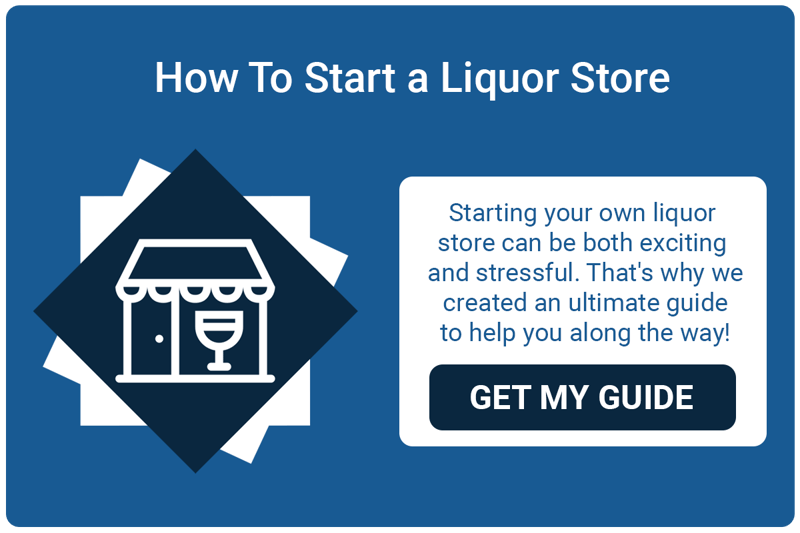Wondering how much you should budget for liquor store inventory costs? Answering these six questions can help you make a plan.
1. How Big Is Your Liquor Store?
The size of your store is a major factor in how much it will cost to stock your shelves.
If you’ve leased or purchased a vast warehouse-style store, you can offer your customers a wider variety of spirits, but it will be much more expensive to purchase your initial inventory. On the other hand, a smaller space generally lowers your liquor store inventory costs, but you won’t be able to keep a comprehensive selection in stock.
To strike the right balance between sparse and cluttered, take a careful look at your shelving and refrigeration units and map out where you’ll place each type, brand, and size of spirit. From there, you’ll be able to get a more accurate estimate of what it will cost to fill your unique space with the right amount of inventory.
2. Who Is Your Liquor Supplier?
Another fundamental factor in your liquor store inventory costs is your supplier.
Your supplier is responsible for delivering the right spirits in the right amounts to your store in a timely manner, ensuring customers can always find what they’re looking for on your shelves.
Liquor wholesale prices can vary wildly, so make sure to evaluate several different options when looking for a supplier to stock your store’s shelves.
Remember that your supplier costs are just one part of the equation when it comes to financial success. Once you’ve secured your inventory, you’ll need to set the right prices to turn a healthy profit.
3. Which Spirits Do Your Customers Want?
Who is your ideal customer? What’s their favorite cocktail? Why do they choose your liquor store over the competition?
Your answers to these questions have a significant impact on your liquor store inventory costs.
For example, if you own a boutique liquor store situated in a trendy area, your customers will expect to find a curated selection of luxury brands and rare blends on your shelves. Securing these premium products will require a higher upfront investment, but you’ll be able to charge a higher price for them.
In contrast, if your customer base is on the hunt for the best deal on their favorite beverages, you’ll stock a wider range of more popular, affordable brands. While these products might be cheaper to stock, keep in mind that you’ll have higher sales volume and will need to place larger inventory orders more frequently.
Thinking critically about which products to stock will give you a more accurate idea of your liquor store inventory costs and help you tailor your offerings to your customers' preferences.

4. How Do Your Sales Change With the Seasons?
Your liquor store inventory costs aren’t a constant.
Your store’s sales trends, volume, and most popular products will change over time and with the seasons — and your inventory strategies should shift, too.
During the summer months, you might notice that your customers gravitate toward refreshing beverages like cold beer and wine coolers, while their demand for giftable wines and champagne bottles increases as the holiday season approaches.
Order your stock with seasonal trends like these in mind to make the most of your inventory budget.
5. What Alcohol Taxes Do You Need To Pay?
One indirect factor to keep in mind when calculating your liquor store inventory costs is taxation.
All businesses that sell alcohol in the United States are subject to federal taxes levied by the Alcohol and Tobacco Tax and Trade Bureau (TTB), and these taxes depend on the type of alcohol your store sells. Let’s cover some federal tax basics:
- Beer is taxed by the barrel, and the taxation rate is higher for imported beers than for local brews.
- Wine is taxed according to its alcohol content, with stronger wines being taxed more heavily than weaker ones.
- Spirits are taxed at the highest rate, and like wines, they are also taxed according to their strength.
Some state and local governments levy additional taxes on alcohol sales, so take the time to research which laws apply to your business and account for these taxes when estimating your liquor store inventory budget.
Related Read: How Much Is a Liquor License in California?
6. How Do You Manage Your Liquor Inventory?
Keeping your liquor store inventory costs low and your sales high depends on one critical factor: an effective inventory management strategy.
Without a plan to keep your liquor store well-stocked, you might run out of your bestselling spirits or overstock your underperformers — both of which can make a dent in your bottom line.
That’s why you need a system to track your stock and optimize your inventory. A point of sale (POS) system with robust inventory management features lets you see your stock levels in real time, identify your best and worst-selling liquors, and calculate how quickly your stock turns over.
Equipped with these insights, you can make the most of your liquor store inventory budget and effortlessly maintain the perfect balance of bottles.
Perfect Your Liquor Store Inventory Strategy With Bottle POS
And there you have it: Your liquor store inventory costs will depend on a variety of factors, including how large your space is, who supplies your product, and what your customers want.
The factor that you have the most control over is how you manage your stock. With the help of a POS system like Bottle POS, you can stock the right products in the right amounts, keep your liquor store inventory costs in check, and give your bottom line a boost.
Want to see Bottle POS’ powerful inventory features in action? Schedule your live demo with one of our liquor industry experts today.
















.png?width=477&height=297&name=thumbnail-2%20(1).png)
.png?width=264&height=280&name=transparent%20(1).png)